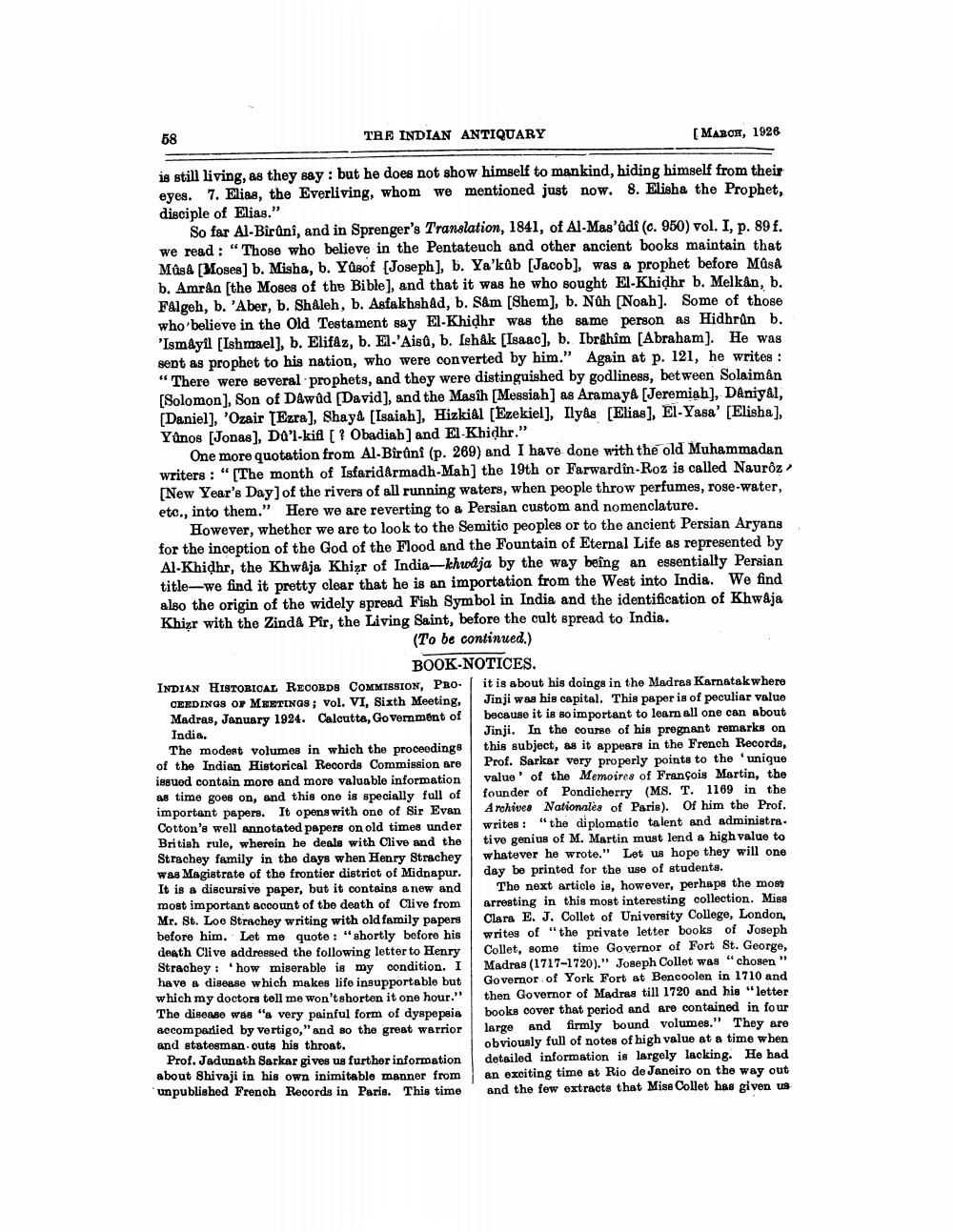________________
68
THE INDIAN ANTIQUARY
[MARCH, 1926
is still living, as they say: but he does not show himself to mankind, hiding himself from their eyes. 7. Elias, the Everliving, whom we mentioned just now. 8. Elisha the Prophet, disciple of Elias."
So far Al-Birûnî, and in Sprenger's Translation, 1841, of Al-Mas'ûdi (c. 950) vol. I, p. 89 f. we read : “Those who believe in the Pentateuch and other ancient books maintain that Mûs& [Moses) b. Misha, b. Yusof (Joseph), b. Ya'kab (Jacob), was a prophet before Musa b. Amran [the Moses of the Bible), and that it was he who sought El-Khidhr b. Melkán, b. FAlgeh. b. 'Aber, b. Sh Aleh, b. Asfakhshad, b. Sam (Shem), b. Náh (Noah). Some of those who believe in the Old Testament say El-Khidhr was the same person as Hidhran b. 'Ismayil [Ishmael], b. Elifaz, b. El-'Aisa, b. sehåk [Isaac), b. Ibrahîm (Abraham). He was sept as prophet to his nation, who were converted by him.” Again at p. 121, he writes : “There were several prophets, and they were distinguished by godliness, between Solaiman [Solomon), Son of Dawad (David), and the Masih [Messiah) as Aramaya (Jeremiah), Daniyal. [Daniel], 'Ozair (Ezra), Shay& (Isaiah), Hizkiál (Ezekiel), Ilyha Elias], El-Yasa' Elishal Yûnos (Jonas), Da'l-kifl [ ? Obadiah) and El-Khidhr."
One more quotation from Al-Birûni (p. 269) and I have done with the old Muhammadan writers: "[The month of Isfaridarmadh-Mah] the 19th or Farwardin-Roz is called Naurôz [New Year's Day) of the rivers of all running waters, when people throw perfumes, rose-water, etc., into them." Here we are reverting to a Persian custom and nomenclature.
However, whether we are to look to the Semitic peoples or to the ancient Persian Aryans for the inception of the God of the Flood and the Fountain of Eternal Life as represented by Al-Khidhr, the Khwaja Khigr of India-khwaja by the way being an essentially Persian title-we find it pretty clear that he is an importation from the West into India. We find also the origin of the widely spread Fish Symbol in India and the identification of Khwaja Khier with the Zinda Pir, the Living Saint, before the cult spread to India.
(To be continued.)
BOOK-NOTICES. INDIAN HISTORICAL RECORDS COMMISSION, PRO- it is about his doings in the Madras Karnatakwhere
CEEDINGS OF MEETINGS ; vol. VI, Sixth Meeting, Jinji was his capital. This paper is of peculiar value Madras, January 1924. Calcutta, Government of because it is so important to learn all one can about India.
Jinji. In the course of his pregnant remarks on The modest volumes in which the proceedings this subject, as it appears in the French Records, of the Indian Historical Records Commission are Prof. Sarkar very properly points to the 'unique issued contain more and more valuable information value of the Memoires of François Martin, the s time goes on, and this one is specially full of founder of Pondicherry (MS. T. 1169 in the important papers. It opens with one of Sir Evan Archives Nationales of Paris). Of him the Prof. Cotton's well annotated papers on old times under writes: "the diplomatio talent and administra. British rule, wherein he deals with Clive and the tive genius of M. Martin must lend a high value to Strachey family in the days when Henry Strachey whatever he wrote." Let us hope they will one was Magistrate of the frontier district of Midnapur. day be printed for the use of students. It is a discursive paper, but it contains a new and The next article is, however, perhaps the most most important account of the death of Clive from arresting in this most interesting collection. Misa Mr. St. Loe Strachey writing with old family papers Clara E. J. Collet of University College, London, before him. Let me quote: "shortly before his writes of "the private letter books of Joseph death Clive addressed the following letter to Henry Collet, some time Governor of Fort St. George, Strachey : 'how miserable is my condition. I Madras (1717-1720).” Joseph Collet was chosen " have a disease which makes life insupportable but Governor of York Fort at Bencoolen in 1710 and which my doctors tell me won't shorten it one hour." then Governor of Madras till 1720 and his "letter The disease was "a very painful form of dyspepsia books cover that period and are contained in four accompartied by Vertigo," and so the great warrior large and firmly bound volumes." They are and statesman outs his throat.
obviously full of notes of high value at a time when Prof. Jadunath Sarkar gives us further information detailed information is largely lacking. He had about Shivaji in his own inimitable manner from an exciting time at Rio de Janeiro on the way out unpublished French Records in Paris. This time and the few extracts that Mise Collet has given us




